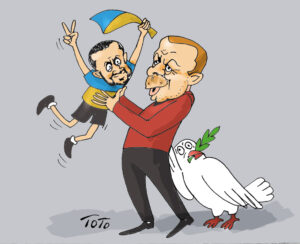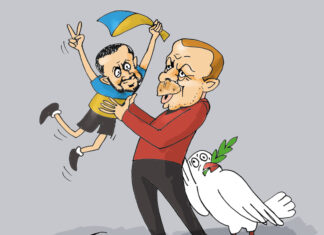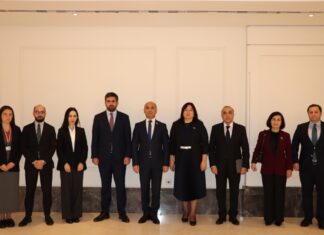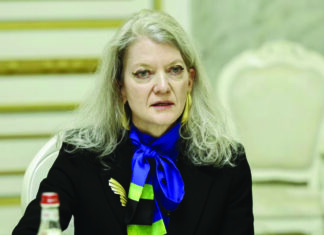YEREVAN/VIENNA — German musicologist, musician and translator Jonas Löffler, 36, studied classical guitar and musicology at the Conservatoire and the University of Basel, in Switzerland, as well as at Oxford University. He completed his doctoral studies at the University of Cologne in Germany, where he defended his doctoral dissertation, titled “Sounds of Empire: Musical Change in Tiflis/Tbilisi between 1880 and 1917,” in 2024. As a classical guitar performer, he has received various scholarships and awards. From 2006 to 2017, he maintained an international concert career as a guitar soloist and chamber musician, performing in Europe and the US. His solo album, “Terra,” was released in 2014. As a researcher, he has presented his work in numerous talks and conferences in countries including Germany, Austria, Georgia, the United Kingdom, Japan, and the US, and has published academic papers in English and German, as well as translations from Georgian to German. Currently he lives in Vienna, where he is a lecturer at the Department of Musicology of the University of Vienna.
Dear Jonas, there’s a joke that people can be divided into two groups: those who love Paris and those who love London. I’ve heard a similar sentiment about Armenia and Georgia, with few who can genuinely appreciate both. I believe you are one of those rare individuals. What sparked your interest in the Caucasus?
My interest in the region was initiated by a figure who somehow brings together both countries as he was an Armenian born in Tiflis: Sergei Parajanov. I was still in high school and saw Parajanov’s “The Color of Pomegranates” at Wiesbaden film festival in Germany. I believe the director of the Yerevan Parajanov Museum was also present at the festival. I was blown away by the film and Parajanov’s work in general in a way only 19-year-olds can be blown away. That day I decided I had to visit the Caucasus, which I did for the first time in 2010, travelling all the way from Istanbul to Goris/Syunik overland. The fascination never waned and I kept returning to Armenia, Georgia, the Russian North Caucasus, Eastern Turkey and Iran as much as I could, visiting a great number of historic sites in all countries and eventually deciding to dedicate myself to the region academically and linguistically, a decision I have never regretted.
The subject of your dissertation was the musical life of Tiflis during the late tsarist era. As a musicologist, how would you characterize the role of Armenians in this context?
Armenians were politically and, in a way, culturally, the dominant group in Tiflis at the time. Tiflis was the cultural center for the Armenians who were living in the Russian Empire and the neighboring regions and thus figured as a magnet for Armenians who wanted to achieve something in the cultural fields. Consequently, there were a great number of Armenians present in all layers of Tiflis musical culture, from Western-style classical music to newly emerging “national” forms of folk music and all the way to what I call the “Persianate” urban music tradition of Tiflis – sazandars, zurna ensembles and ashughs. While figures like the Pitoev (Pitoyan) brothers (Isai and Ivan) were crucial in the establishment of Western-style art music and opera in the city and Vasilii Korganov (Ghorghanyan) almost single-handedly established (Western) music criticism and scholarship in the local (and imperial) press, others, like Kristapor Kara-Murza were focused on establishing decidedly national forms of music making. Both among Georgians and Armenians, the first steps within these national musical endeavors were made in the forms of choirs that were seen as representatives of their nation. Armenians were also central in lower-class entertainment culture. Ashughs like Hazira (Abram Abramov/Abrahamyan), who sang in both Armenian and Georgian (mostly the latter, though), were superstars in modern terms and could publish their songs in countless editions and print runs that outnumbered those of the poets of the local intelligentsias like Hovhannes Tumanyan, or the Georgian Akaki Tsereteli.
You have a working knowledge of dozens of languages. When we first met in 2019, you barely spoke Armenian, but a year later, during our meeting, our conversation was entirely in Armenian, and you continue to write to me in Armenian. How did you achieve this proficiency?








